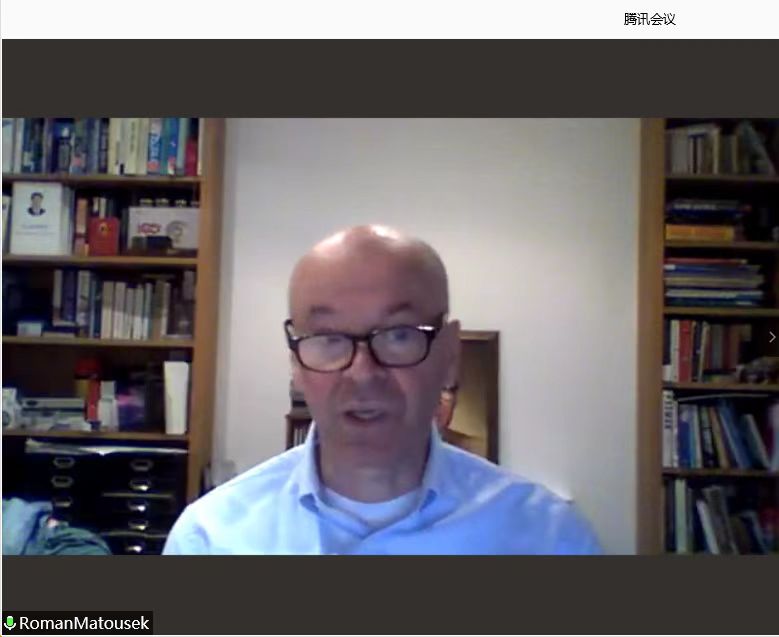
编者按:
为培养高层次国际化人才,打造具备全球视野的国际化教学和科研团队,99905银河官方网不断邀请知名大咖加入学院,让学生们进入全球顶级学者的课堂,Roman教授便是其中之一。全英教学团队李斐斐老师、唐晗怡老师和财务管理专业的常泽远同学、何瞻同学,对Roman教授展开了一次线上专访。通过大洋彼岸传来的电波,感受他从教多年来对中国的情感,从交流中获得国际化视野,汲取潜心学术的力量。
对话Roman教授:没有任何一门学科是一座孤岛
不久前,我们对英国伦敦玛丽女王大学Roman教授开展了一次线上专访。这位出生于1966年3月的国际银行和金融经济学领域全球领先学者,在加入伦敦玛丽女王大学之前是诺丁汉大学全球银行和金融创新中心的研究主任,曾任北京航空航天大学和同济大学国际客座教授,具有重要的国际学术影响力和学术地位。目前受聘于我校99905银河官方网,担任国际化团队的主要外籍专家,讲授《国际金融》、《风险管理》等课程。
从饮食文化到学生评价,从课堂氛围到学术态度,从批判思维到未来展望……我们聊了许多,也收获了许多,精彩的部分不胜枚举,整理出来与大家分享。

Roman Matousek教授
中国学生:学术素养与学习态度的优秀集合体
在包括北京航空航天大学、同济大学、暨南大学在内的众多中国高校开设银行与金融相关课程的经历,让Roman教授对中国学生的学术素养与学习态度有了深刻的认识。量化能力强、分析技能出色、勤奋上进、敏于思考、敢于质疑……这些都是Roman教授给予中国学生的评价。
问:您如何评价中国学生的学术素养?
答:我在中国和英国都遇到过许多中国学生,甚至现在仍指导着中国博士生。在我的印象中,中国学生普遍具备极高的量化技能,拥有这项技能对于他们攻读金融或经济学学位绝对是巨大的优势。除此之外,中国学生具有出色的分析技能。举例来说,每次给山师99905银河官方网财务管理(中美合作)专业的学生授课结束后,我都会从教科书中挑选20至30个并不简单的多项选择题供学生课下思考,然而就在几周前,学生们独立发现了教科书答案中的两处错误。这件事不仅充分体现了他们优异的分析能力,也让我更加了解到他们一丝不苟的学术态度。
问:中国学生在学术研究上普遍具备哪些品质?
答:在我看来,目前我在山师教的学生都十分努力,并且有十分强烈的动力去冲击高分。并且就像我刚才提到的那样,学生们独立发现教科书中错误的这件事能够充分反映中国学生对待学术的严谨与认真。积极进取、勤奋好学、敢于质疑权威……这些作为学生的品质是我所欣赏的,也恰恰是不少中国学生具备的。

Roman教授在线上课堂与学生们积极讨论
金融学习:割裂与其他学科之间的联系是不可取的
就像帕斯卡说的那样,“人是一根能思想的苇草”,机械地将知识灌入大脑并不算真正掌握它们,能够让知识改变思想、运用它们解决现实问题才算将知识内化于心。金融学作为一门应用性学科更是如此,在学习过程中单纯理解知识只达到表层目的,能够运用其提出问题、解决问题才称得上触及知识内核。同时,学习金融学不能片面地聚焦于某个问题,而应该运用学科交叉的方法将其作为一个有机系统来研究。
问:您认为学习金融需要具备怎样的思维?
答:学习金融的学生需要擅长定量方法,需要利用跨学科的知识。这意味着他们应该看到不同教学科目之间的联系。例如,如果我们谈论金融危机,需要使用批判性和分析性思维来进一步应用宏观经济学、金融机构和金融工具方面的知识。因此,不应该孤立地思考危机,而应该结合更广泛的背景来思考。思考和解释知识不应该是分离与割裂的,而应像拼接镶嵌图案一样将各学科联系起来。
问:吸收知识和提出问题相比,您更看重哪一个?
答:在我的学术生涯中曾遇到过一些学生,他们非常善于吸收知识,却无法提出一个实际问题并解决它,这对研究生来说是一个非常典型的问题。一名优秀的学生需要具有开放的思想,并能够质疑他们学到的知识。他们需要就某些问题形成自己的观点,并发现有待解决的挑战性问题。如今,人们不再像30年前那样需要百科全书式的知识,我们可以很容易地找到信息,但并不是每个人都知道如何使用和应用这些信息,这对我们来说才是真正的挑战。
问:您是否建议山师学子未来出国深造?
答:我非常建议同学们出国留学开拓学术视野,这对他们的职业生涯来说是一项很好的投资。正如我们之前讨论过的区块链技术和金融科技,我所在的英国伦敦玛丽女王大学刚开设了区块链的新硕士学位。我很希望能在我们的商业与管理学院看到山师学生。我已经在99905银河官方网任教近一年了,对山师学子也有了一定的了解,我有信心山师学生已经做好了在海外领先研究型大学留学的准备。
放眼未来:数字化经济发展如火如荼
从两百年前瓦特发明蒸汽机开启第一次工业革命使得英国成为骄傲的“日不落帝国”,到如今推动制造业向智能化转型的工业4.0影响着全人类生存处境,人类历史上每一次巨大的社会变革与进步,势必与科学技术的重大突破息息相关。经济领域也不例外,互联网领航的数字化经济发展正在如火如荼地进行。
问:在科技进步的洪流之下,未来金融行业将会如何发展?
答:我最近出版了一本关于区块链和金融科技的书。我们认为,经济的数字化正迅速发展,技术进步渗透到每个人的日常业务活动中,数字化变革正蔓延到每个业务领域,特别是我们观察到金融业正发生着一些里程碑式的变化。技术变革的实施无疑是由客户需求驱动的,不论站在客户角度,还是站在数字创新开发者角度,这些需求都受到千禧一代的重大影响,银行业是展示这些变化的一个很好的例子。从这个方面讲,中国已成为全球金融科技使用和发展的领导者。
问:Roman教授未来是否会选择在证券交易所投资理财?
答:对于一个金融学教授来说,这是一个好问题。在投资这方面,我像大多数中国投资者一样,更看好房产的发展。或许作为一个投资者,我更倾向于锚定房地产这种相对而言有些过时的行业。
以上便是我们整理的专访Roman教授的全部内容,未来我们仍可以期望99905银河官方网聘请更多如Roman教授一般权威的国际学术专家为商院学子带来更多精彩课程,进一步开拓商院学子的学术视野、培养全球化思维,早日成长为堪当民族复兴重任的国家建设者。
Editor's note:
In order to cultivate high-level international talents and build an international teaching and research team with a global perspective, the School of Business has been inviting renowned figures to join and give students access to the classes of top scholars around the world, and Professor Roman is one of them. Assoicate Professor Li Fei Fei, Ms Tang Hanyi from English teaching team and our students Chang Zeyuan and He Zhan had an online interview with Professor Roman. Through the radio waves from across the ocean, we were able to experience his connection to China after years of teaching. From the exchange, we were able to gain an international perspective and learn the power of academic dedication.
Conversation with Professor Roman: No discipline is an island
We recently conducted an online interview with Professor Roman of Queen Mary University of London. Born in March 1966, this world-leading scholar in international banking and financial economics was previously Director of Research at the Centre for Global Banking and Financial Innovation at the University of Nottingham and an international visiting professor at Beijing University of Aeronautics and Astronautics and Tongji University before joining Queen Mary, and has significant international academic influence and standing. He is currently employed at our Business School as the lead foreign expert and joins English teaching team and international collaborative research team. He is teaching《Risk Management》and 《International Finance》for SDNU students.
From food culture to student evaluation, from classroom atmosphere to academic attitudes, from critical thinking to future outlook ...... We talked a lot and gained a lot, and the highlights are too numerous to list, so I'll collate them and share them with you.

Professor Roman Matousek
Chinese students: an excellent combination of academic quality and attitude to learning
Having delivered banking and finance related courses in many Chinese universities including Beijing University of Aeronautics and Astronautics, Tongji University and Jinan University, Professor Roman has gained a deep understanding of the academic quality and learning attitude of Chinese students. Strong quantitative skills, excellent analytical skills, diligent and motivated, keen to think and question ...... are all comments Professor Roman gives to his Chinese students.
Question: How do you assess the academic quality of Chinese students?
Pro Roman: I have met many Chinese students in both China and the UK, and even now still supervise Chinese PhD students. My impression is that Chinese students generally have very high quantitative skills, which is a huge advantage for them to study for a degree in finance or economics. In addition to this, Chinese students have excellent analytical skills. For example, at the end of every lecture I give to students in the Financial Management program at Business School, I select 20 to 30 multiple choice questions from the textbook for them to think about in class, but just a few weeks ago, the students independently found two errors in the textbook answers. This not only demonstrated their excellent analytical skills, but also gave me a better understanding of their meticulous academic attitude.
Question: What qualities do Chinese students generally have in their academic studies?
Pro Roman: In my opinion, the students I am teaching at SDNU are very hard working and very motivated to achieve high grades. And as I mentioned earlier, the fact that students are independently finding errors in textbooks reflects the rigor and seriousness with which Chinese students approach academics. Being motivated, diligent and willing to question authority ...... are qualities that I admire in students and that many Chinese students possess.

Professor Roman's online class actively discusses with students
Finance learning: it is not advisable to cut off links with other disciplines
As Pascal said, "Man is a reed that can think", mechanically putting knowledge into the brain is not really mastering it. This is particularly true for finance as an applied subject. In the learning process, simply understanding the knowledge only serves a superficial purpose; only when one is able to use it to ask questions and solve problems can one be considered to have reached the core of knowledge. At the same time, the study of finance should not be focused on a single issue, but should be studied as an organic system using a cross-disciplinary approach.
Question: What kind of thinking do you think you need to have to study finance?
Pro Roman: Students studying finance need to be good at quantitative methods and need to use interdisciplinary knowledge. This means that they should see the links between the different subjects taught. For example, if we talk about the financial crisis, we need to use critical and analytical thinking to further apply knowledge of macroeconomics, financial institutions and financial instruments. Therefore, the crisis should not be thought of in isolation, but in a wider context. Thinking and interpreting knowledge should not be separated and fragmented, but should link the disciplines together like a patchwork mosaic.
Question: Which do you value more, absorbing knowledge or asking questions?
Pro Roman: In my academic career I have come across students who are very good at absorbing knowledge but are unable to ask a practical question and solve it, which is a very typical problem for postgraduate students. A good student needs to be open-minded and able to question what they have learned. They need to form their own opinions on certain issues and identify challenging problems to be solved. Today, people no longer need encyclopedic knowledge as they did 30 years ago, we can find information easily, but not everyone knows how to use and apply it, and that is the real challenge for us.
Question: Do you recommend that students from SDNU go abroad for further study in the future?
Pro Roman: I would highly recommend that students study abroad to expand their academic horizons; it is a good investment for their careers. As we've discussed before about blockchain technology and fintech, my university, Queen Mary University of London, has just opened a new Master’s degree in blockchain. I would love to see SDNU students in our School of Business and Management. I have been teaching at Shandong Normal University for almost a year now and have gotten to know the SDNU students well, and I am confident that SDNU students are ready to study at leading research universities overseas.
Looking to the future: the digital economy is in full swing
From Watt's invention of the steam engine two hundred years ago, which started the first industrial revolution and made Britain the proud "Empire of the Sun", to Industry 4.0, which is now driving the transformation of manufacturing into an intelligent industry that affects the survival of all mankind, every great social change and progress in human history is inevitably linked to a major breakthrough in science and technology. The economic sector is no exception, with the digital economy led by the Internet in full swing.
Question: How will the financial sector evolve in the future, given the flood of technological advances?
Pro Roman: I have recently published a book on blockchain and fintech. We believe that the digitization of the economy is rapidly evolving, technological advances are permeating everyone's daily business activities, digital change is spreading to every area of business, and in particular we are observing some landmark changes in the financial sector. The implementation of technological change is undoubtedly driven by customer needs, both from the customer's point of view and from the point of view of digital innovation developers, and these needs are significantly influenced by the millennial generation, and the banking sector is a good example to showcase these changes. In this respect, China has become a global leader in the use and development of fintech.
Question: Will you choose to invest his money on the stock exchange in the future?
Pro Roman: That is a good question for a professor of finance. In terms of investment, I am more bullish on property, like most Chinese investors. Perhaps as an investor, I prefer to anchor on a sector like real estate which is relatively a bit outdated.
This is all we have compiled from our interview with Professor Roman. In the future, we can still expect the Business School to hire more international academic experts as authoritative as Professor Roman to bring more exciting courses to the students of the Business School, further developing their academic horizons and global thinking, so that they can grow up to be the builders of a nation that can bear the heavy responsibility of national rejuvenation.